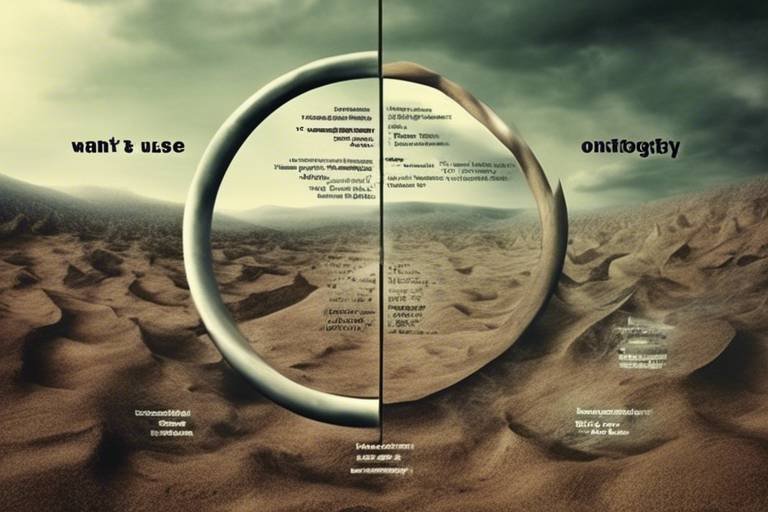Exploring the Unknown Realm with Metaphysics
Metaphysics is like peering into a vast, uncharted territory, where the mysteries of existence and the fabric of reality intertwine. Imagine standing at the edge of a great ocean, the waves of thought crashing against the shores of understanding. This article delves into the intriguing world of metaphysics, examining its principles, applications, and the philosophical questions it raises about existence, reality, and the nature of the universe. As we embark on this journey, we will uncover the layers of meaning that shape our perceptions and beliefs, challenging us to think deeply about what it means to be alive and aware.
At its core, metaphysics seeks to address fundamental questions that have puzzled humanity for centuries. What is the nature of reality? Is there a distinction between the physical and the non-physical? And how do our minds relate to the universe around us? These inquiries not only fuel philosophical debates but also inspire scientific exploration. Throughout history, thinkers and scholars have grappled with these profound issues, leading to a rich tapestry of ideas that continue to evolve today.
As we navigate through the principles of metaphysics, we will encounter various perspectives that illuminate the relationship between consciousness and the physical world. This exploration is not merely academic; it has real-world implications that can influence how we perceive ourselves and our place in the cosmos. From the dualistic views that separate mind and body to monistic perspectives that unite them, the philosophical landscape is as diverse as it is complex.
In addition to its philosophical foundations, metaphysics also intersects with science, particularly in fields like quantum physics, where the act of observation plays a crucial role in determining the nature of reality. This relationship between metaphysical concepts and scientific inquiry raises important questions about the nature of truth and our understanding of the universe.
Ultimately, metaphysics is not just an abstract discipline; it has practical applications in our daily lives. By examining our beliefs and understanding the underlying principles of existence, we can foster personal growth, enhance our ethical frameworks, and make more informed decisions. As we delve deeper into this fascinating realm, we invite you to question, explore, and discover the profound implications of metaphysics on your own life.
- What is metaphysics? Metaphysics is a branch of philosophy that explores the fundamental nature of reality, including concepts such as existence, being, and the universe.
- How does metaphysics relate to science? Metaphysics and science intersect in areas like quantum physics, where philosophical questions about reality and observation play a significant role in scientific theories.
- What are the practical applications of metaphysics? Metaphysical principles can guide personal growth, ethical decision-making, and a deeper understanding of one’s existence.

The Foundations of Metaphysics
Understanding the core principles of metaphysics is essential for anyone venturing into this fascinating field. Metaphysics is often described as the branch of philosophy that deals with the fundamental nature of reality, exploring questions that go beyond the physical world. It seeks to answer some of the most profound inquiries about existence, time, space, and the nature of objects and their properties. To truly grasp the essence of metaphysics, we need to look back at its historical roots and the key concepts that form its foundation.
The term "metaphysics" originates from the works of Aristotle, who compiled a collection of texts that addressed what he called "first philosophy." These texts examined what lies beyond the physical, hence the prefix "meta." Over the centuries, metaphysics has evolved, branching into various subfields such as ontology, which studies being and existence, and cosmology, which focuses on the universe's origins and structure. This evolution reflects humanity's continuous quest to understand the universe and our place within it.
At its core, metaphysics grapples with several fundamental questions:
- What is the nature of reality?
- Do abstract concepts like numbers and properties exist independently of the physical world?
- What is the nature of objects and their relationships?
- Is there a distinction between mind and matter?
These inquiries not only challenge our understanding but also push us to rethink our perceptions of existence. For instance, when we consider the nature of reality, we might question whether what we perceive through our senses is the entirety of existence or merely a fraction of a more complex reality. This leads to intriguing discussions about the limits of human knowledge and the potential for undiscovered realms beyond our current understanding.
Moreover, metaphysics has significant implications for other disciplines, including science and ethics. By establishing a framework for understanding reality, metaphysics influences how we interpret scientific findings and moral philosophies. For example, the debate between realism and anti-realism in science is deeply rooted in metaphysical discussions about the existence of an objective reality versus the subjective interpretation of observations.
As we delve deeper into metaphysics, it's crucial to recognize that its principles are not merely theoretical. They have practical applications that can shape our everyday lives. Whether it’s through personal development, ethical decision-making, or even our understanding of consciousness, metaphysics offers valuable insights that can enhance our experiences and perspectives.
In summary, the foundations of metaphysics are built upon a rich historical context and a series of profound questions that challenge our understanding of reality. By exploring these principles, we can gain a deeper appreciation of the complexities of existence and the interconnectedness of all things. As we continue our journey through the realms of metaphysics, we will uncover how these foundational concepts influence our perceptions and interactions with the world around us.
- What is metaphysics? - Metaphysics is a branch of philosophy that studies the fundamental nature of reality, including concepts such as being, existence, and the universe.
- Who is considered the father of metaphysics? - Aristotle is often referred to as the father of metaphysics due to his significant contributions to the field.
- How does metaphysics relate to science? - Metaphysics provides a framework for understanding the principles that underpin scientific theories and helps address questions about the nature of reality that science may not fully answer.
- Can metaphysical concepts be applied in everyday life? - Yes! Metaphysical principles can guide personal development, ethical decision-making, and enhance self-awareness.

The Relationship Between Mind and Matter
When we dive into the fascinating realm of metaphysics, one of the most captivating debates centers around the relationship between mind and matter. This discussion isn't just academic; it touches on the very essence of what it means to be human. Have you ever wondered how your thoughts can influence your physical reality? Or why the mind seems to dance so freely while the body is bound by the laws of physics? These questions have puzzled philosophers, scientists, and curious minds alike for centuries.
At its core, the relationship between mind and matter revolves around two primary philosophical viewpoints: dualism and monism. Dualism, famously advocated by René Descartes, suggests that the mind and body are distinct entities. This perspective posits that our consciousness exists separately from our physical form, almost like a ghost haunting a house. On the other hand, monism argues that mind and matter are not separate but rather different aspects of the same reality. Imagine a coin: one side is the mind, and the other is the body, yet they are inseparable.
Throughout history, various thinkers have contributed to this ongoing dialogue. For instance, Descartes’ assertion that "I think, therefore I am" emphasizes the primacy of consciousness, suggesting that our existence is validated through thought. Yet, this raises a compelling question: if the mind is separate from the body, how do they interact? This is where the debate gets truly intriguing. Some propose that the mind can influence the body through mental states—think of the placebo effect, where belief in a treatment can lead to real, physical changes in the body.
Conversely, modern philosophers have been redefining the conversation around monism. They argue that consciousness is not just an epiphenomenon of brain activity but is intertwined with the physical universe. This perspective aligns with many scientific findings in neuroscience, which suggest that our thoughts and emotions are deeply rooted in our brain's physical structure. The implications of this are profound: if our thoughts are products of physical processes, what does that mean for our sense of free will and personal identity?
To further illustrate these concepts, consider the following table that summarizes the key differences between dualism and monism:
| Aspect | Dualism | Monism |
|---|---|---|
| Nature of Reality | Mind and body are separate | Mind and body are interconnected |
| Philosophical Roots | Descartes, Plato | Spinoza, modern neuroscientists |
| Implications for Free Will | Mind can influence body | Body influences mind |
As we navigate these complex philosophical waters, we also encounter the implications of consciousness itself. Different metaphysical views can lead to different interpretations of reality, identity, and free will. For instance, if we accept dualism, we might feel a stronger sense of individualism, believing that our thoughts are uniquely ours and can shape our physical reality. However, if we lean towards monism, we may come to see ourselves as part of a larger, interconnected web of existence, where our actions and thoughts are influenced by a myriad of factors beyond our control.
In summary, the relationship between mind and matter is not just a philosophical question; it’s a profound inquiry into the nature of our existence. As we continue to explore this dynamic interplay, we uncover layers of understanding about ourselves, our consciousness, and our place in the universe. So, the next time you ponder your thoughts or feel the weight of your decisions, remember: the dance between your mind and body is a captivating performance that has been unfolding for centuries.
- What is dualism? Dualism is the philosophical view that the mind and body are distinct and separate entities.
- What is monism? Monism posits that mind and body are different aspects of the same reality and are interconnected.
- How do these concepts affect our understanding of free will? The implications of dualism might suggest a stronger sense of individualism, while monism could imply that our choices are influenced by a larger system.
- Who were the key philosophers in this debate? Notable figures include René Descartes for dualism and Baruch Spinoza for monism.

Dualism vs. Monism
The debate between dualism and monism is one of the most captivating discussions in the realm of metaphysics. At its core, this philosophical inquiry seeks to unravel the intricate relationship between the mind and the body, ultimately asking the question: are they fundamentally different, or are they merely two sides of the same coin? Dualism, famously advocated by thinkers like René Descartes, posits that the mind and body are distinct entities. This perspective suggests that mental phenomena cannot be fully explained by physical processes alone, which leads to a fascinating exploration of consciousness as something separate from the material world.
On the flip side, we have monism, which argues that everything is interconnected, and that the mind and body are not separate but rather different manifestations of the same underlying reality. This viewpoint encourages us to consider the possibility that our thoughts, feelings, and consciousness are not isolated experiences but are deeply intertwined with the physical universe. Think of it like a river and its banks; while they appear different, they are part of the same system, influencing and shaping one another.
Throughout history, these opposing views have sparked intense discussions, leading to various interpretations and adaptations. For instance, dualism often aligns with the idea of an immortal soul, suggesting that our essence transcends physical existence. In contrast, monism tends to embrace a more scientific approach, focusing on how consciousness arises from complex interactions within the brain and body. To illustrate this further, consider the following table that summarizes the key differences between dualism and monism:
| Aspect | Dualism | Monism |
|---|---|---|
| Nature of Existence | Mind and body are separate entities | Mind and body are one and the same |
| Philosophical Roots | René Descartes, Plato | Spinoza, modern neuroscience |
| Consciousness | Non-physical, transcendent | Emerges from physical processes |
| Implications | Free will, moral responsibility | Determinism, interconnectedness |
As we dive deeper into these philosophical waters, it's essential to recognize that both dualism and monism have their strengths and weaknesses. Dualism can provide a comforting narrative about the soul and personal identity, but it often struggles to explain how the mind interacts with the physical world. Monism, while grounded in scientific inquiry, may leave some feeling that it oversimplifies the richness of human experience. Ultimately, this ongoing dialogue not only shapes our understanding of consciousness but also influences how we perceive ourselves and our place in the universe.
In the end, whether one leans towards dualism or monism, the beauty of this debate lies in its ability to challenge our perceptions and expand our understanding. It beckons us to question everything we know about existence and pushes the boundaries of our intellectual exploration. So, which side do you find yourself on? Are you more inclined to believe in the separation of mind and body, or do you see them as intertwined threads in the fabric of reality?
- What is dualism? Dualism is the philosophical view that the mind and body are distinct entities, suggesting that mental phenomena cannot be entirely explained by physical processes.
- What is monism? Monism is the belief that everything is interconnected, and that the mind and body are not separate but rather different manifestations of the same reality.
- Who are some key figures in the dualism vs. monism debate? Key figures include René Descartes for dualism and Baruch Spinoza for monism, along with many modern neuroscientists who explore consciousness.
- What are the implications of these philosophies? Dualism often raises questions about free will and moral responsibility, while monism emphasizes determinism and interconnectedness.

Historical Perspectives on Dualism
The debate surrounding dualism has deep historical roots, stretching back to ancient philosophical traditions. At its core, dualism asserts that the mind and body are distinct entities, a notion that has captivated thinkers for centuries. One of the most notable proponents of this view was René Descartes, a 17th-century French philosopher, who famously articulated the idea of "Cogito, ergo sum" or "I think, therefore I am." Descartes proposed that the mind, characterized by thought and consciousness, is separate from the physical body, which operates in the realm of material existence.
Descartes' dualism sparked a significant philosophical discourse, leading to various interpretations and critiques. For instance, he introduced the concept of interactionism, suggesting that while the mind and body are distinct, they can influence one another. This perspective raised intriguing questions: How does an immaterial mind interact with a material body? Can thoughts cause physical actions? These questions continue to resonate in contemporary discussions about the nature of consciousness and its relationship to the physical world.
Another key figure in the dialogue of dualism was Gottfried Wilhelm Leibniz, who proposed a different angle with his theory of pre-established harmony. Leibniz argued that the mind and body do not interact directly but instead operate in a synchronized manner, as if they were two clocks set to the same time. This perspective offered a solution to the interaction problem posed by Descartes, suggesting a more harmonious relationship between the two realms without direct influence.
Throughout history, dualism has faced challenges from various philosophical movements. The rise of materialism in the 19th century, for instance, posited that everything, including consciousness, could be explained through physical processes. Thinkers like Karl Marx and later, Friedrich Engels, argued that human consciousness is a product of material conditions, thus rejecting the dualistic separation of mind and body. This materialist perspective paved the way for modern scientific approaches to understanding consciousness, often sidelining dualism in favor of more empirical explanations.
In the 20th century, the emergence of behaviorism further shifted the focus away from dualism. Psychologists such as B.F. Skinner emphasized observable behavior rather than internal mental states, suggesting that psychology should only study what can be seen and measured. This approach essentially dismissed the importance of the mind in favor of behavior, creating a significant divide between dualist and behaviorist frameworks.
Despite these challenges, dualism has not vanished from philosophical discourse. Contemporary thinkers like David Chalmers have revitalized interest in dualist perspectives, especially in the context of the hard problem of consciousness. Chalmers argues that while we can explain many aspects of brain function, the subjective experience of consciousness remains elusive, suggesting that a dualistic approach might be necessary to fully understand the nature of reality.
In summary, the historical perspectives on dualism reveal a rich tapestry of ideas and debates that continue to shape our understanding of the mind-body relationship. From Descartes' foundational principles to modern interpretations, dualism remains a pivotal topic in metaphysical inquiry, inviting us to explore the profound questions of existence and consciousness.
- What is dualism? Dualism is the philosophical view that the mind and body are two distinct entities that interact with each other.
- Who is a key figure in dualism? René Descartes is one of the most prominent figures associated with dualism, known for his famous statement "I think, therefore I am."
- What is the difference between dualism and materialism? Dualism posits that mind and body are separate, while materialism asserts that everything, including consciousness, is a result of physical processes.
- What modern theories support dualism? Contemporary discussions, such as those by David Chalmers, have revived interest in dualism, especially concerning the hard problem of consciousness.

Monism in Modern Philosophy
Monism, the philosophical viewpoint that posits everything in existence is fundamentally one, has gained traction in modern philosophical discourse. Unlike dualism, which separates mind and body into distinct entities, monism offers a more unified perspective on reality. This shift in thinking resonates with many contemporary philosophers who seek to bridge the gap between consciousness and the physical universe. One of the most compelling aspects of monism is its ability to simplify our understanding of complex phenomena. Imagine trying to solve a puzzle with pieces that don’t fit together; monism provides a cohesive framework that allows us to see how everything interconnects.
Several modern philosophers have contributed significantly to the development of monistic thought. For instance, the works of Spinoza laid the groundwork for understanding the universe as a single substance, where everything, including thoughts and physical objects, is a manifestation of this one reality. Similarly, Hegel introduced the idea of absolute idealism, suggesting that reality is a rational process that unfolds over time, emphasizing the unity of thought and being.
In contemporary discussions, monism often intersects with advancements in neuroscience and quantum physics. As scientists delve deeper into the nature of consciousness, they find that many of their findings challenge traditional dualistic views. For example, the discovery of neural correlates of consciousness suggests that our thoughts and experiences are closely tied to physical processes in the brain. This evidence supports a monistic interpretation, where mental states are seen as emergent properties of physical systems.
Moreover, monism is not just a theoretical concept; it has practical implications for how we understand ourselves and our place in the universe. By embracing a monistic perspective, individuals can foster a sense of interconnectedness with the world around them. This realization can lead to profound shifts in personal development, ethics, and even environmental consciousness. When we recognize that we are part of a larger whole, our decisions and actions become more mindful and responsible.
To illustrate the relevance of monism in modern philosophy, consider the following table that contrasts key aspects of monism and dualism:
| Aspect | Monism | Dualism |
|---|---|---|
| Nature of Reality | Unified and interconnected | Divided into mind and body |
| Philosophical Roots | Spinoza, Hegel | Descartes, Kant |
| Implications for Consciousness | Emergent from physical processes | Separate and distinct from physical |
| Impact on Ethics | Encourages interconnectedness | Individualistic and often competitive |
In summary, monism in modern philosophy challenges us to rethink our understanding of existence. It encourages a holistic view that recognizes the intricate web of connections between all things. As we continue to explore the depths of consciousness and the nature of reality, monism offers a promising framework that not only enriches philosophical inquiry but also enhances our personal and ethical lives.
As we delve deeper into the realms of metaphysics, it becomes increasingly clear that our understanding of the universe is more profound than we once believed. Monism invites us to consider the unity of all things, urging us to reflect on our place within this grand tapestry of existence.
- What is monism? Monism is the philosophical belief that everything in existence is fundamentally one, emphasizing the interconnectedness of all things.
- How does monism differ from dualism? While dualism posits that mind and body are separate entities, monism asserts that they are part of a unified reality.
- What are the implications of monism for personal development? Embracing monism can lead to a greater sense of interconnectedness, fostering mindfulness and responsible decision-making.
- Who are some key figures associated with monism? Philosophers like Spinoza and Hegel have made significant contributions to monistic thought.

Implications of Consciousness
When we dive into the vast ocean of consciousness, we find ourselves navigating through a myriad of implications that challenge our understanding of existence. Consciousness isn't just a passive observer; it's an active participant in shaping our reality. This leads us to ponder profound questions: What does it mean to be conscious? How does our awareness influence our decisions and perceptions of the world around us? The implications of consciousness extend beyond mere philosophical musings; they touch the very fabric of our identity and ethical frameworks.
One of the most intriguing aspects of consciousness is its relationship with free will. If we accept that consciousness plays a pivotal role in our choices, we must confront the age-old debate: Are we truly free in our decisions, or are they predetermined by a complex interplay of biological, psychological, and social factors? This question leads us to consider the implications of determinism and the extent to which we can claim ownership of our actions.
Furthermore, consciousness challenges our notions of identity. Are we the sum of our experiences, or is there a deeper essence that defines us? This inquiry can lead to a transformative understanding of self. For instance, if we view identity as fluid, shaped by our conscious experiences, we may become more open to change and personal growth. On the other hand, a rigid perspective on identity might trap us in past narratives, limiting our potential.
In addition to free will and identity, the implications of consciousness also extend to our understanding of reality itself. The way we perceive and interpret the world is inherently tied to our conscious experiences. For example, two individuals may witness the same event but interpret it in vastly different ways based on their unique consciousness. This subjectivity raises questions about the nature of reality: Is it an objective truth that exists independently of our perceptions, or is it constructed through our conscious experiences?
These implications have profound effects on our ethical considerations as well. Our understanding of consciousness influences how we perceive the rights of other beings. If we recognize that consciousness is a spectrum, extending beyond humans to animals and potentially even artificial intelligence, we may need to reconsider our ethical obligations. This could lead to a more inclusive moral framework that respects the consciousness of all sentient beings.
To summarize, the implications of consciousness are vast and multi-faceted, touching upon free will, identity, reality, and ethics. As we explore these themes, we not only enrich our understanding of metaphysics but also gain insights into our own lives. The journey into consciousness is not merely an academic pursuit; it is a deeply personal exploration that can transform how we see ourselves and the world around us.
- What is consciousness? Consciousness refers to the state of being aware of and able to think about one's own existence, thoughts, and surroundings.
- How does consciousness affect free will? Consciousness plays a significant role in decision-making, raising questions about whether our choices are genuinely free or influenced by external factors.
- Can consciousness exist independently of the body? This is a debated topic in metaphysics, with dualism suggesting a separation between mind and body, while monism posits they are interconnected.
- What are the ethical implications of consciousness? Recognizing consciousness in various beings can lead to more compassionate ethical frameworks that consider the rights of all sentient life.

Metaphysics and Science
The relationship between metaphysics and science is a fascinating dance, where each discipline influences and informs the other. While science seeks to understand the physical universe through observation and experimentation, metaphysics probes deeper into the fundamental nature of reality itself. This intersection raises profound questions: What is the nature of existence? How do we know what we know? And can we truly separate the observer from the observed? These inquiries have led to a rich tapestry of thought that challenges our understanding of both the universe and our place within it.
At its core, metaphysics deals with questions that science often takes for granted. For instance, consider the concept of causality. Science assumes that every effect has a cause, yet metaphysics challenges us to think about what 'cause' really means. Is it merely a sequence of events, or is there something more profound at play? This philosophical inquiry can lead to a deeper understanding of scientific principles and the limitations of empirical evidence.
One of the most intriguing areas where metaphysics and science converge is in quantum physics. Here, the metaphysical implications of quantum phenomena, such as superposition and entanglement, challenge our classical intuitions about reality. For instance, the famous thought experiment known as Schrödinger's cat illustrates the bizarre nature of quantum states, where a cat can be simultaneously alive and dead until observed. This paradox not only defies our traditional understanding of reality but also raises questions about the role of the observer in shaping that reality.
In quantum physics, metaphysical principles are essential for interpreting phenomena that defy classical logic. The act of observation is not just a passive process; it fundamentally alters the state of what is being observed. This leads to the metaphysical debate about whether reality is objective and independent of our perception or if it is, in some way, shaped by our consciousness. This question can be likened to a painter creating a masterpiece—does the painting exist independently of the artist, or is it a reflection of the artist's vision?
Moreover, the implications of these quantum theories extend beyond the realm of physics. They challenge our understanding of determinism and free will, suggesting that the universe may not be as predictable as we once thought. This uncertainty echoes in our own lives, where the unpredictability of choices and outcomes can feel both liberating and daunting.
Another significant debate at the intersection of metaphysics and science is between scientific realism and anti-realism. Scientific realism posits that the world described by scientific theories is indeed real and exists independently of our perceptions. In contrast, anti-realism argues that scientific theories are merely useful instruments for predicting phenomena, without necessarily reflecting an objective reality. This philosophical divide raises essential questions about the nature of truth and the limits of human understanding.
To illustrate this, consider the following table that summarizes the key differences between scientific realism and anti-realism:
| Aspect | Scientific Realism | Anti-Realism |
|---|---|---|
| Nature of Reality | Objective and independent of observers | Constructed through human practices |
| Truth of Scientific Theories | Reflects actual states of affairs | Useful models for predicting outcomes |
| Role of Observation | Confirms the existence of entities | Shapes the understanding of phenomena |
As we navigate this complex landscape, it becomes clear that metaphysics and science are not mutually exclusive. Instead, they form a symbiotic relationship that enriches our understanding of the universe. By engaging with metaphysical questions, scientists can gain deeper insights into the implications of their work, while philosophers can ground their inquiries in the realities illuminated by scientific discoveries. This ongoing dialogue not only expands our knowledge but also invites us to ponder the very nature of existence itself.
- What is the main focus of metaphysics? Metaphysics primarily deals with questions about existence, reality, and the nature of objects and their properties.
- How does metaphysics relate to science? Metaphysics explores the foundational principles underlying scientific theories, often addressing questions that science assumes without direct evidence.
- What is quantum metaphysics? Quantum metaphysics examines the philosophical implications of quantum mechanics, particularly regarding the nature of reality and observation.
- Why is the mind-body problem significant? The mind-body problem is significant because it addresses the relationship between consciousness and the physical world, impacting our understanding of identity and free will.

The Role of Metaphysics in Quantum Physics
The fascinating world of quantum physics often leaves us scratching our heads, doesn't it? It's a realm where the rules of classical physics seem to bend and twist, revealing a universe that operates on principles that are as bewildering as they are profound. Here, metaphysics plays a crucial role, acting as a bridge between the abstract theories of quantum mechanics and our understanding of reality. So, how does metaphysics influence our interpretation of quantum phenomena? Let's dive in!
At its core, quantum physics challenges our conventional notions of reality. Take, for instance, the concept of superposition, where particles exist in multiple states simultaneously until observed. This idea raises profound metaphysical questions about the nature of existence itself. Are these particles real when they are not being observed? Or do they only 'become' real through the act of observation? This dilemma leads us to ponder the implications of consciousness in the quantum realm, suggesting that our awareness might play an active role in shaping reality.
Moreover, the phenomenon of entanglement—where particles become interconnected in such a way that the state of one instantly influences the state of another, regardless of distance—challenges our understanding of locality and separateness. It forces us to reconsider the very fabric of reality and how interconnected everything truly is. This is where metaphysical inquiry becomes essential, as it helps us navigate these complex ideas and their implications for our understanding of existence.
To further illustrate this relationship, let's consider a few key metaphysical concepts that directly influence our interpretation of quantum physics:
- Reality and Observation: The role of the observer in quantum mechanics suggests that consciousness may have a direct impact on physical processes.
- Determinism vs. Indeterminism: Quantum mechanics introduces a level of unpredictability that challenges classical deterministic views of the universe.
- Nature of Existence: The duality of particles behaving as both waves and particles prompts questions about what it means for something to exist.
In essence, metaphysics provides a framework for understanding the philosophical implications of quantum physics. It encourages us to ask deeper questions about the universe, such as: What is reality? How does consciousness interact with the physical world? And what does it mean to exist in a universe governed by quantum mechanics? By exploring these questions, we can gain profound insights into the nature of reality and our place within it.
As we continue to unravel the mysteries of quantum physics, the interplay between metaphysics and science becomes increasingly evident. This relationship not only enriches our understanding of the universe but also challenges us to expand our thinking beyond the tangible and into the realm of the unknown. So, the next time you ponder the complexities of quantum mechanics, remember that metaphysics is there, guiding you through the enigma of existence.
- What is the relationship between metaphysics and quantum physics? Metaphysics helps us explore the philosophical implications of quantum mechanics, questioning the nature of reality and the role of the observer.
- How does consciousness affect quantum phenomena? The act of observation in quantum mechanics suggests that consciousness may play a role in determining the state of particles.
- What are some key metaphysical concepts relevant to quantum physics? Concepts such as reality and observation, determinism vs. indeterminism, and the nature of existence are all significant in understanding quantum mechanics.

Scientific Realism vs. Anti-Realism
The debate between scientific realism and anti-realism is a captivating exploration of how we understand the universe and our place within it. At its core, scientific realism posits that the world described by science is not only a useful tool for explaining phenomena but is also a reflection of an objective reality that exists independently of our perceptions. In contrast, anti-realism challenges this notion, suggesting that the theories and models we develop are merely instruments for organizing our experiences and do not necessarily correspond to any 'true' reality.
To better grasp these concepts, consider the following distinctions:
| Aspect | Scientific Realism | Anti-Realism |
|---|---|---|
| Nature of Reality | Objective reality exists independent of observation | Reality is shaped by our perceptions and theories |
| Truth of Scientific Theories | Scientific theories are true representations of the world | Scientific theories are useful fictions or models |
| Role of Observation | Observation reveals the underlying reality | Observation is influenced by our theoretical frameworks |
This philosophical divide raises profound questions about the nature of knowledge itself. For instance, if scientific theories are merely constructs, what does that say about the validity of our understanding of complex phenomena such as quantum mechanics or relativity? On the other hand, if we accept scientific realism, we must grapple with the implications of theories that are continually evolving, leading us to wonder whether we are ever truly grasping the essence of reality.
Moreover, this debate is not just theoretical; it has practical implications in the scientific community. For example, when scientists approach a new discovery, their underlying beliefs about reality can influence how they interpret data and formulate hypotheses. A scientific realist might be more inclined to trust that their findings reveal something significant about the universe, while an anti-realist might view the same data as a stepping stone to further understanding, without assuming it reflects a deeper truth.
In summary, the discourse between scientific realism and anti-realism is not merely academic; it invites us to reflect on how we perceive the world around us. Are we uncovering truths about the universe, or are we simply navigating a complex web of interpretations? This question resonates deeply in both scientific inquiry and our everyday lives, prompting us to consider the foundations of our beliefs and the nature of our understanding.
- What is scientific realism? Scientific realism is the view that the universe described by science exists independently of our perceptions and that scientific theories aim to accurately represent this reality.
- What is anti-realism? Anti-realism holds that scientific theories are not necessarily true representations of an objective reality, but rather tools for organizing our experiences and observations.
- How does this debate affect scientific research? The beliefs of scientists regarding realism or anti-realism can influence how they interpret data, formulate hypotheses, and approach new discoveries.

Practical Applications of Metaphysics
Metaphysics isn't just a lofty academic pursuit; it has real-world implications that can significantly impact our daily lives. Imagine being able to navigate the complexities of existence with a deeper understanding of the concepts of reality, consciousness, and identity. Metaphysical principles can serve as a compass guiding us through the murky waters of personal development and ethical decision-making. In this section, we will explore how these abstract ideas can be applied practically, helping individuals cultivate a richer and more meaningful existence.
One of the most profound applications of metaphysics is in the realm of personal growth. By engaging with metaphysical concepts, individuals can embark on a journey of self-discovery that fosters greater self-awareness. For instance, the idea that our thoughts shape our reality can empower us to adopt a more positive mindset. This is akin to planting seeds in a garden; with the right care and attention, those seeds can blossom into beautiful flowers of personal transformation. By understanding the interconnectedness of mind and matter, we can learn to harness our consciousness to create the life we desire.
Moreover, metaphysics encourages us to question our assumptions about existence and our place in the universe. This questioning can lead to profound insights about our identities and relationships. For example, the exploration of consciousness can help us recognize that our identity is not fixed but rather fluid and evolving. Such realizations can inspire us to embrace change and adapt to new circumstances, much like a river that carves its path through the landscape, constantly reshaping itself while remaining true to its essence.
Another vital application of metaphysics lies in the realm of ethics. Our metaphysical beliefs can shape our moral frameworks and influence our behavior towards others. For instance, if one subscribes to a dualistic view, they might see a clear distinction between the self and others, potentially leading to a more self-centered approach to ethics. Conversely, a monistic perspective, which emphasizes the unity of all existence, can foster compassion and empathy. This perspective encourages individuals to see themselves in others, promoting a sense of interconnectedness that can lead to more ethical decision-making.
To illustrate this point further, consider the following table that summarizes how different metaphysical views can influence ethical behavior:
| Metaphysical View | Ethical Implications |
|---|---|
| Dualism | May lead to self-centered ethics, focusing on individual rights and separateness. |
| Monism | Promotes empathy and compassion, emphasizing the interconnectedness of all beings. |
| Idealism | Encourages the pursuit of higher ideals and moral truths, shaping ethical frameworks around them. |
| Materialism | Can lead to a more pragmatic approach to ethics, focusing on tangible outcomes and consequences. |
In essence, metaphysics provides a lens through which we can examine our beliefs and values, allowing us to make more informed choices in our lives. By applying these principles, we can foster personal growth and ethical behavior that not only benefits ourselves but also contributes positively to society as a whole. It’s about creating a ripple effect of understanding and compassion that extends far beyond our individual experiences.
- What is metaphysics? Metaphysics is a branch of philosophy that explores the fundamental nature of reality, existence, and the relationship between mind and matter.
- How can metaphysics help in personal development? By understanding metaphysical concepts, individuals can gain insights into their consciousness, identity, and the nature of reality, leading to personal growth.
- What role does metaphysics play in ethics? Metaphysical beliefs shape our moral frameworks and influence our behavior towards others, impacting ethical decision-making.
- Can metaphysics influence scientific inquiry? Yes, metaphysical concepts often underpin scientific theories and help interpret complex phenomena, especially in fields like quantum physics.

Metaphysics in Personal Growth
When we think about personal growth, it often conjures images of self-help books, motivational speakers, and the relentless pursuit of success. However, there’s a deeper, more profound layer to personal development that stems from the principles of metaphysics. At its core, metaphysics encourages us to explore the fundamental nature of our existence, pushing us to ask questions like: Who am I? What is my purpose? How do I connect with the universe around me? By engaging with these inquiries, we can unlock pathways to self-awareness and transformation that are often overlooked.
Imagine your life as a vast ocean, with metaphysics serving as the compass guiding you through the waves of existence. Just as sailors rely on their compass to navigate treacherous waters, we can rely on metaphysical principles to navigate the complexities of our inner selves. This journey of self-discovery is not merely about achieving external goals but about understanding our internal landscape, our desires, fears, and motivations. It’s about recognizing that we are not just passive observers in our lives; we are active participants in shaping our reality.
One of the most compelling aspects of metaphysics in personal growth is its emphasis on consciousness. The idea that consciousness is not just a byproduct of our brain activity but a fundamental aspect of our being opens up a world of possibilities. When we acknowledge our consciousness as a powerful tool, we can start to harness it for personal transformation. This involves practices such as meditation, mindfulness, and visualization, which allow us to tap into our deeper selves and align our actions with our true intentions.
Furthermore, metaphysics encourages us to explore the concept of interconnectedness. We are not isolated entities; rather, we are part of a larger tapestry of existence. This realization can profoundly impact our relationships and interactions with others. When we understand that our thoughts and actions resonate beyond ourselves, we become more mindful of how we treat others and the world around us. This shift in perspective fosters empathy, compassion, and a genuine desire to contribute positively to our communities.
To illustrate how metaphysical principles can influence personal growth, consider the following table that outlines key metaphysical concepts and their practical applications:
| Metaphysical Concept | Application in Personal Growth |
|---|---|
| Consciousness | Utilizing mindfulness practices to enhance self-awareness and emotional regulation. |
| Interconnectedness | Fostering empathy and compassion in relationships, leading to healthier interactions. |
| Reality Creation | Using visualization and intention-setting to manifest personal goals and aspirations. |
| Purpose | Engaging in self-reflection to uncover one’s true passion and direction in life. |
In conclusion, integrating metaphysical principles into our personal growth journey can be transformative. It invites us to look beyond the surface and delve into the depths of our being. By embracing consciousness, recognizing our interconnectedness, and understanding the power of our intentions, we can navigate our lives with greater clarity and purpose. So, the next time you find yourself on a quest for personal growth, remember that metaphysics offers a rich and enlightening perspective that can illuminate your path.
- What is metaphysics? Metaphysics is a branch of philosophy that explores the fundamental nature of reality, existence, and the relationship between mind and matter.
- How can metaphysics aid in personal growth? By encouraging self-reflection, mindfulness, and an understanding of interconnectedness, metaphysics helps individuals gain deeper insights into themselves and their purpose.
- Can metaphysical practices be integrated into daily life? Absolutely! Practices like meditation, visualization, and mindfulness can easily be incorporated into daily routines to enhance self-awareness and personal development.
- Is metaphysics a spiritual practice? While metaphysics can have spiritual implications, it is primarily a philosophical inquiry that can complement various belief systems and practices.

Ethical Considerations in Metaphysics
When we dive into the depths of metaphysics, we inevitably encounter a web of ethical considerations that shape our understanding of existence and our place within the universe. Metaphysics, at its core, is not just about pondering the nature of reality; it also prompts us to reflect on the moral implications of our beliefs. Have you ever thought about how your views on reality affect your actions? This is where metaphysics meets ethics, creating a fascinating interplay that can guide our decisions and behaviors.
One of the primary ethical questions that arise from metaphysical inquiry is the concept of free will. If we believe our actions are determined by a set of physical laws or metaphysical principles, how does this influence our sense of responsibility? For instance, if everything is predetermined, can we truly hold individuals accountable for their actions? This dilemma has been a hot topic among philosophers for centuries, leading to diverse interpretations and debates. Some argue that even within a deterministic framework, we can still find meaning in our choices, while others suggest that true free will is an illusion.
Moreover, metaphysical beliefs can shape our ethical frameworks significantly. Consider the following points:
- Materialism: If one subscribes to a materialistic view, where only the physical world is deemed real, ethical considerations may lean towards utilitarianism, focusing on the greatest good for the greatest number.
- Idealism: In contrast, those who embrace idealism might prioritize the intrinsic value of ideas and consciousness, leading to ethical frameworks that emphasize compassion and the interconnectedness of all beings.
- Dualism: Those who believe in a dualistic nature of reality may grapple with the moral implications of separating mind and body, potentially leading to ethical dilemmas regarding the treatment of others.
These differing metaphysical perspectives not only influence personal ethics but also affect societal norms and laws. For example, a society that leans towards a deterministic view might implement laws that focus more on rehabilitation rather than punishment, reflecting a belief in the influence of circumstances over individual choices. On the other hand, societies that emphasize free will may adopt stricter punitive measures, holding individuals fully accountable for their actions.
Furthermore, the ethical implications of metaphysical beliefs extend into realms such as environmental ethics, social justice, and even technological advancements. As we contemplate our relationship with the universe, we must also consider our responsibilities towards the planet and each other. For instance, if we view ourselves as stewards of the Earth, this metaphysical belief could lead to more sustainable practices and a deeper commitment to protecting our environment.
In conclusion, the intersection of metaphysics and ethics presents a rich tapestry of questions and considerations that challenge us to reflect on our beliefs and their implications. As we navigate through life, it becomes crucial to recognize how our metaphysical views shape our ethical decisions. Are we merely products of our environment, or do we have the power to shape our destinies? The answers to these questions not only define our understanding of reality but also guide us in our moral journeys.
- What is the relationship between metaphysics and ethics?
Metaphysics explores the nature of reality, while ethics examines moral principles. Together, they influence our understanding of responsibility, free will, and our obligations to others. - How do different metaphysical views affect ethical behavior?
Different views, such as materialism or idealism, can lead to varying ethical frameworks, shaping how individuals and societies approach moral dilemmas. - Can metaphysical beliefs influence social justice?
Yes, metaphysical beliefs can guide societal norms and laws, impacting how justice is perceived and enacted within communities.
Frequently Asked Questions
- What is metaphysics?
Metaphysics is a branch of philosophy that explores the fundamental nature of reality, existence, and the universe. It seeks to answer questions about what things are, how they exist, and what it means to be. Think of it as the philosophical backbone that supports our understanding of everything around us.
- How does metaphysics relate to science?
Metaphysics and science are intertwined in many ways. While science focuses on empirical evidence and observable phenomena, metaphysics delves into the underlying principles and assumptions that inform scientific theories. For instance, concepts in quantum physics often require metaphysical interpretations to make sense of the bizarre behaviors observed at the subatomic level.
- What are the main debates in metaphysics?
Some key debates in metaphysics include the relationship between mind and matter (dualism vs. monism), the nature of free will, and the reality of universals. These discussions can get quite deep, often challenging our perceptions of existence and reality itself. It's like trying to solve a puzzle where the pieces keep changing shape!
- Can metaphysical concepts be applied in daily life?
Absolutely! Metaphysical principles can influence personal development, ethical decision-making, and even how we perceive our existence. For example, understanding concepts like interconnectedness can foster empathy and compassion in our daily interactions. It's like having a map that guides you through the complexities of life.
- What is the significance of dualism and monism?
Dualism and monism represent two contrasting views on the relationship between mind and body. Dualism suggests that they are distinct entities, while monism posits that they are fundamentally one. This debate has significant implications for our understanding of consciousness, identity, and what it means to be human.
- How does consciousness fit into metaphysical discussions?
Consciousness is a central topic in metaphysics, raising questions about free will, identity, and the nature of reality. Different metaphysical views can lead to varying interpretations of consciousness, from seeing it as a product of physical processes to viewing it as a fundamental aspect of the universe. It's a fascinating area that continues to spark debate among philosophers.
- Is metaphysics relevant in modern philosophy?
Yes, metaphysics remains highly relevant in modern philosophy. Contemporary thinkers are re-examining traditional metaphysical questions and applying them to new contexts, such as advancements in science and technology. It's a dynamic field that evolves with our understanding of the world.



















